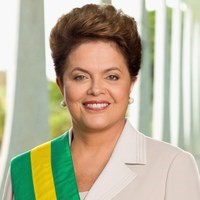After her release, Rousseff moved to Porto Alegre in Rio Grande do Sul, married lawyer Carlos Franklin Paixão de Araújo, her partner since 1969, and resumed her economics studies at the Federal University of Rio Grande do Sul. In 1975, she began working at the state’s Foundation for Economics and Statistics (FEE). Her daughter, Paula, was born the following year.
Rousseff was a founding member of the Democratic Labor Party (PDT), led by Leonel Brizola. In 1986, she became Finance Secretary of Porto Alegre at the invitation of Alceu Colares. In the early 1990s, she returned to FEE as president. She served twice as State Secretary of Energy, Mines, and Communications, first under Alceu Colares and then under PT member Olívio Dutra. In 2000, she joined the Workers’ Party (PT).
When Lula was elected President for his first term (2003-2006), he appointed Dilma as Minister of Mines and Energy. Amid a major government crisis in June 2005, which led to the departure of several PT leaders, Lula named Rousseff as Chief of Staff, replacing José Dirceu, then the party’s most prominent minister. In this position, she debated internally with key economic minister Antonio Palocci, who had been unable to achieve economic growth. Rousseff proposed a development model focused on income distribution, which was eventually adopted by the government. This solidified her as Lula’s top minister and led to her being chosen as his successor. She was elected president in 2010.
In her first term, Rousseff continued Lula’s policies, expanding social programs, although she lacked the favorable international economic conditions of her predecessor and gradually lost the support of major business sectors. Economic growth remained low throughout her term, yet she succeeded in eradicating extreme poverty, removing Brazil from the global hunger map.
In June 2013, amid protests against World Cup expenditures, her popular support dropped significantly. Later that year, in September, it was revealed that the U.S. government had spied on the president and other areas of her administration, including Petrobras. In retaliation, Rousseff canceled a planned U.S. visit, which eventually took place in June 2015, restoring cooperation between Brazil and the U.S.
During her 2014 re-election campaign, Rousseff faced two opposition candidates: Aécio Neves of the Brazilian Social Democracy Party (PSDB) and Marina Silva of the Brazilian Socialist Party (PSB). The contest was close, but Rousseff ultimately defeated Neves in a second-round runoff by a margin of 3%.
The opposition, unwilling to accept defeat, sought to prevent her from taking office through street protests and impeachment threats, with systematic support from major media outlets, which had openly campaigned for opposition candidates during the election. For the first time, a president was elected despite significant opposition from the business sector, the media, and the Brazilian Democratic Movement Party (PMDB), which was officially part of the governing coalition.
Her second term was marked by economic and especially political crises and lasted only a few tumultuous months. On August 29, 2016, Rousseff was removed from office through what she described as a parliamentary coup in the form of an impeachment process, in which the vice president’s party, PMDB, played a significant role. Upon assuming office, Michel Temer quickly implemented a series of austere and unpopular measures.



